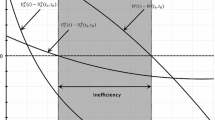Abstract
The paper compares decision-making on the centralisation of public goods provision in the presence of regional externalities under representative and direct democratic institutions. A model with two regions, two public goods and regional spillovers is developed in which uncertainty over the true preferences of candidates makes strategic delegation impossible. The political economy argument against centralisation of Besley and Coate (J Public Econ 87:2611–2637, 2003) does therefore not apply. Instead, it is shown that the existence of rent extraction by delegates alone suffices to make cooperative centralisation more likely through representative democracy under reasonable assumptions. In the case of non-cooperative centralisation, the more extensive possibilities for institutional design under representative democracy increase the likelihood of centralisation. Direct democracy may thus be interpreted as a federalism-preserving institution.
Similar content being viewed by others
References
Alesina A (1988) Credibility and policy convergence in a two-party system with rational voters. Am Econ Rev 78: 796–805
Alesina A, Spolaore E (1997) On the number and size of nations. Q J Econ 112: 1027–1056
Alesina A, Angeloni I, Etro F (2005) International unions. Am Econ Rev 95: 602–615
Besley T, Coate S (1997) An economic model of representative democracy. Q J Econ 112: 85–114
Besley T, Coate S (2003) Centralized versus decentralized provision of local public goods: a political economy approach. J Public Econ 87: 2611–2637
Blankart CB (2000) The process of government centralization: a constitutional view. Const Political Econ 11: 27–39
Brennan G, Buchanan JM (1980) The power to tax. Analytical foundations of a tax constitution. Cambridge University Press, Cambridge
de Figueiredo RJP, Weingast BR (2005) Self-enforcing federalism. J Law Econ Organ 21: 103–135
Dur R, Roelfsema H (2005) Why does centralisation fail to internalise policy externalities. Public Choice 122: 395–416
Ellingsen T (1998) Externalities vs internalities: a model of political integration. J Public Econ 68: 251–268
Feld LP, Schaltegger C, Schnellenbach J (2008) On budget referendums and government centralization: evidence from Switzerland. Eur Econ Rev 52: 611–645
Gilligan TW, Matsusaka JG (1999) Structural constraints on partisan bias under the efficient gerrymander. Public Choice 100: 65–84
Gilligan TW, Matsusaka JG (2006) Public choice principles of redistricting. Public Choice 129: 381–398
Grandmont JM (1978) Intermediate preferences and the majority rule. Econometrica 46: 317–330
Lorz O, Willmann G (2005) On the endogenous allocation of decision powers in fedral structures. J Urban Econ 57: 242–257
Matsusaka JG (2004) For the many or the few. The initiative, public policy and American democracy. University of Chicago Press, Chicago
Matsusaka JG, McCarty NM (2001) Political resource allocation: benefits and costs of voter initiatives. J Law Econ Organ 17: 413–448
Mazza I, van Winden F (2002) Does centralization increase the size of government? the effects of separation of powers and lobbying. Int Tax Public Finance 9: 379–389
Oates WE (1972) Fiscal federalism. Harcourt Brace, New York
Osborne MJ, Slivinski A (1996) A model of political competition with citizen-candidates. Q J Econ 111: 65–96
Persson T, Tabellini G (1994) Separation of powers and political accountability. Eur Econ Rev 38: 765–773
Qian Y, Weingast BR (1997) Federalism as a commitment to preserving market incentive. J Econ Perspectives 11: 83–92
Redoano M, Scharf KA (2004) The political economy of policy centralization: direct versus representative democracy. J Public Econ 88: 799–817
Weingast BR (1979) A rational choice perspective on congressional norms. Am J Political Sci 23: 245–262
Weingast BR (1995) The economic role of political institutions: market-preserving federalism and economic development. J Law Econ Organ 11: 1–31
Author information
Authors and Affiliations
Corresponding author
Rights and permissions
About this article
Cite this article
Schnellenbach, J., Feld, L.P. & Schaltegger, C. The impact of referendums on the centralisation of public goods provision: a political economy approach. Econ Gov 11, 3–26 (2010). https://doi.org/10.1007/s10101-009-0063-1
Received:
Accepted:
Published:
Issue Date:
DOI: https://doi.org/10.1007/s10101-009-0063-1




